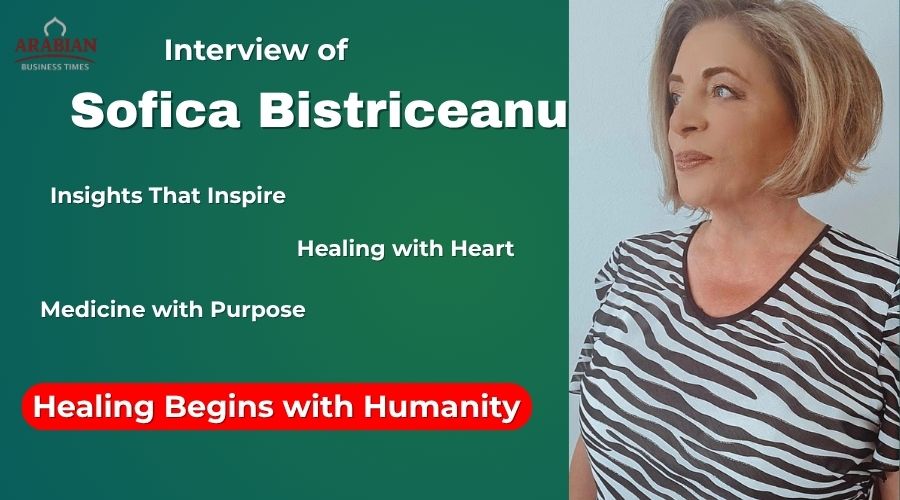In a world where healthcare is rapidly evolving through innovation and technology, Dr. Sofica stands as a beacon of compassion, knowledge, and visionary leadership. As a dedicated family physician and pediatric specialist, her mission extends far beyond treating illnesses — it’s about understanding the human story behind every patient. In this exclusive interview with Taim Al Falasi, Dr. Sofica shares her inspiring journey into medicine, her passion for pediatrics and emergency care, and her vision for a future where empathy and technology work hand in hand to redefine healthcare.

Taim Al Falasi – Could you tell us about your journey into medicine and what inspired you to become a family physician?
Dr. Sofica –
My journey into medicine was driven by a curiosity about human life and the many factors that influence health and well-being. From the beginning, I recognized that family medicine offers a unique perspective because it involves providing long-term care and observing patients and their families within their own environment. This ongoing care helps us understand how genetics, education, social connections, technology, and lifestyle work together to shape a person’s health.
I chose family medicine because it allows me to treat people not just as patients but as whole human beings within their families and communities. The ability to provide comprehensive, compassionate care, along with the responsibility to innovate and improve healthcare delivery, motivated me to pursue this path. Over time, my mission has evolved from individual care to encompass research, teaching, and promoting healthy communication as a foundation for well-being. For me, medicine is both a science and an act of service, and family medicine enables me to honor both aspects.
Taim Al Falasi – What motivated you to focus on pediatrics and emergency medicine?
Dr. Sofica –
My motivation to focus on pediatrics and emergency medicine came from a strong desire to serve patients at their most vulnerable moments. Children represent the future, and their health requires not only medical expertise but also sensitivity, patience, and genuine compassion. Working with children allows us to see the direct impact of care — often through their smiles, honesty, and resilience — which serves as a constant reminder of why this profession is so meaningful.
Emergency medicine, on the other hand, demands quick thinking, precision, and courage. In urgent situations, every decision can alter the course of a patient’s life. This field taught me the importance of acting quickly and efficiently, making evidence-based decisions, and showing empathy to all parties in relationships, even in the most critical situations.
Both pediatrics and emergency medicine have enriched my journey as a physician, giving me the ability to combine gentle, nurturing care with the strength to act decisively when every second counts. Together, they reinforce my belief that medicine is not only about curing disease but also about protecting life with dignity and compassion.
Taim Al Falasi – How has your training at the Netherlands School of Primary Care Research influenced your approach to family medicine?
Dr. Sofica –
Training provided by the Netherlands School of Primary Care Research was a pivotal moment in my professional journey. It provided me with a strong foundation in evidence-based medicine and demonstrated how scientific research can be applied to enhance daily clinical practice. I learned to consider symptoms within a broader context—including environmental, social, and emotional factors that affect human functioning.
I believe that family medicine is not only about treating illnesses but also about prevention, communication, and building long-term trust with patients and their families. The rigorous training helped me integrate research into practice, develop new hypotheses, and present my findings internationally, always with the goal of making care more holistic, compassionate, and effective. It instilled in me the confidence that family medicine can be both highly scientific and deeply human.
Taim Al Falasi – In your experience, how has Healthcare Information Technology (HIT) improved patient care?
Dr. Sofica –
Healthcare Information Technology (HIT) has transformed the way we deliver patient care by making it more efficient, accessible, and personalized. Digital records, telemedicine, and data-driven tools enable physicians to track patient progress in real-time, coordinate care with other specialists, and ensure continuity of care even beyond the clinic. This has been especially valuable in family medicine, where long-term monitoring and understanding of patient history are essential.
HIT also empowers patients by giving them easier access to health information, enabling informed decisions, and fostering a stronger partnership between provider and patient. In emergencies, technology accelerates communication, reduces errors, and ensures that critical information is available instantly. Most importantly, it helps prevent physician burnout by streamlining administrative tasks and allowing us to focus more on the human side of medicine — listening, understanding, and caring. When used wisely, technology does not replace human compassion; it enhances the accuracy and efficiency of our work.
Taim Al Falasi – What has been one of the most rewarding moments in your medical career so far?
Dr. Sofica –
One of the most rewarding moments in my medical career was realizing the profound impact of compassionate communication on a patient’s recovery. I remember working with vulnerable individuals whose health was declining despite proper medication. Through attentive listening and supportive conversation, it became clear that negative interactions and emotional stress played a significant role in their health issues. By addressing these factors, the patient’s health can improve significantly, reminding us that medicine involves as much empathy and communication skills as it does prescriptions and procedures.
Moments like these — when patients and their families express genuine gratitude, when children smile and say they want to return, or when former patients recommend my care to the next generation — give me a deep sense of fulfillment. These experiences confirm that my efforts not only treat illnesses but also touch lives in ways that endure far beyond the clinical setting.
Taim Al Falasi – What are some of the key challenges family physicians face today, and how can they be addressed?
Dr. Sofica –
Family physicians today face multiple challenges, including increasing patient expectations, time constraints, administrative burdens, and the need to stay updated with rapidly evolving medical knowledge and technologies. Balancing the clinical, emotional, and logistical aspects of care can sometimes be overwhelming, particularly when patients present with complex, multi-faceted health issues.
To address these challenges, it is essential to adopt a holistic and team-based approach. Utilizing technology for patient records, telemedicine, and data analysis can improve efficiency, while continuous professional development ensures physicians remain current in evidence-based practice. Equally important is fostering strong communication with patients and families, which enhances understanding, trust, and adherence to care plans. By combining innovation, compassion, and collaboration, family physicians can overcome these challenges and continue to provide high-quality, personalized care.”
Taim Al Falasi – How do you see the future of family medicine and pediatrics evolving in the UAE and globally?’

Dr. Sofica –
I see the future of family medicine evolving toward a more patient-centered, technology-enabled, and preventive approach, both in the UAE and globally. Advances in digital health, telemedicine, and data analytics will allow physicians to monitor patients remotely, detect early warning signs, and provide timely interventions, while maintaining the personal connection that is central to family medicine.
Globally, there is an increasing emphasis on holistic care that integrates mental, physical, and social well-being. In the UAE, the healthcare system’s focus on innovation, accessibility, and high standards of care positions family physicians and pediatricians to play a pivotal role in shaping healthier communities. Ultimately, the combination of compassion, evidence-based practice, and technology will define the next era of medicine, ensuring that care is efficient, equitable, and impactful for generations to come.
Taim Al Falasi – What advice would you give to young doctors entering family medicine?
Dr. Sofica –
My advice to young doctors entering family medicine is to embrace both the science and the humanity of the profession. Focus on building strong communication skills, as listening and understanding patients often reveal more than tests and prescriptions alone. Be curious, stay updated with medical advancements, and never stop learning — whether through research, conferences, or collaboration with peers.
Equally important is cultivating compassion, patience, and resilience. Family medicine allows you to witness patients’ lives over time, giving you the unique opportunity to make a lasting impact. Approach each patient as a whole person, invest in building trust, and remember that even small acts of care can create profound and enduring change. Success in this field comes not only from medical expertise but from your ability to connect, inspire, and uplift those you serve.
Additionally, healthcare professionals must be aware of burnout and address it effectively because it can undermine everything they have worked hard to build.
Taim Al Falasi – Are there any healthcare innovations or trends you are particularly excited about?
Dr. Sofica –
I am particularly excited about innovations that integrate technology with personalized patient care. Telemedicine, remote monitoring, and wearable devices are transforming how we track health in real time, enabling early interventions and continuous support, especially for chronic conditions. Artificial intelligence and data analytics also hold great promise in predicting risks, optimizing treatment plans, and improving overall outcomes.
Equally inspiring are trends that emphasize holistic and preventive care, where mental, emotional, and social well-being are considered alongside physical health. I believe the combination of compassionate care with these technological and research-driven tools will redefine the future of medicine, allowing us to serve patients more efficiently while maintaining the human connection that lies at the heart of healing.
Taim Al Falasi – What is your vision for improving patient education and accessibility in healthcare?
Dr. Sofica –
My vision for improving patient education and accessibility centers on empowering individuals to take an active role in their health while ensuring care reaches everyone, regardless of location or circumstances. Clear, compassionate communication is key — patients should understand their conditions, treatment options, and preventive measures in a way that is meaningful to them. People informed about the harmful effects of unsafe interactions with others on their health will make more informed choices about their life paths. Our mission is to inform, not impose challenges on them.
I also see technology as a powerful enabler. Telemedicine, digital health platforms, and community-based programs can bridge gaps in access, especially for seniors, children, and those in remote areas. By combining education, technology, and personalized support, we can create a healthcare environment where patients feel informed, confident, and connected — ultimately leading to healthier communities and more effective care delivery.
Thank you,
Conclusion:

As Dr. Sofica reminds us, medicine is not merely about diagnosis and treatment — it is a lifelong commitment to healing, understanding, and empowering others. Her blend of compassion, innovation, and dedication reflects the true spirit of modern healthcare. In an era increasingly shaped by technology, her approach reinforces a timeless truth: that the heart of medicine will always lie in human connection. Through her work, Dr. Sofica continues to inspire a new generation of physicians to care deeply, think boldly, and serve with purpose.
Let’s connect and discuss healthcare innovation

